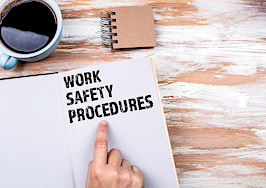 September means Back to Basics here at Inman. As real estate navigates the post-settlement era with new commission rules, real estate professionals from across the country will share what’s working for them, how they’ve evolved their systems and tools, and where they’re investing personally.
September means Back to Basics here at Inman. As real estate navigates the post-settlement era with new commission rules, real estate professionals from across the country will share what’s working for them, how they’ve evolved their systems and tools, and where they’re investing personally.
Real estate agents face one of the greatest collections of criminal threats to plague any industry. Not only are there personal risks in meeting clients, hosting open houses and showing properties, but there are also cybercrime risks to you and your clients’ personal information. In the routine course of your job, you may make decisions that could put yourself or your agency at risk for attack.
Real estate agents often find themselves getting into some dangerous situations, and for decades, I have been trying to spread the word — but it’s not working. Instead, I hear the same thing over and over and over:”It can’t happen to me.” OK, well, it can happen to you, but the likelihood of it happening is relatively slim. However, that doesn’t mean you shouldn’t do anything about it or put systems in place to reduce risk.
Making an attempt at preventing harm is smart. Denying the reality that real estate is a high-risk profession is not. When you work in real estate, you might have to visit areas that are not safe, you might face a vicious dog, or you might even have a creep walk right into an open house. Here’s how to reduce your risk.
Do some research
This is easy. Prior to meeting with a potential buyer, do a little research. This might be as simple as doing a Google/Facebook/Instagram/cell phone number/physical address search on them. If this person truly exists, their data is bound to show up.
You’d be amazed at what comes up when basic, personally identifiable information is plugged into the Internet. Often you’ll find the very basic information like name matching with physical address, but sometimes you’ll find court records, or even articles saying they were arrested for driving while intoxicated.
We also suggest, prior to actually doing business with them, creating a questionnaire to get information from them.
Get a driver’s license
Prior to working with any client, get some form of identification. If you are meeting at the property for the first time, have them text you a copy of their driver’s license. If you’re meeting at the office even better. Ask for the ID of any potential buyer/seller before showing the home.
You should be able to get a photo of their ID and keep it on your phone and text it to a colleague just in case. If they refuse, this is a red flag. Do not underestimate this risk-reducing strategy, it’s simple, it’s easy and it’s effective. Do it for all of your clients, not just a select few.
Show during daylight hours
Only show a home during daylight hours. This suggestion may not be practical during certain times of the year, but there is something about “freaks come out at night” that, unfortunately, rings true in this industry.
Bring a buddy
The buddy system definitely reduces risk. Do you have an assistant, friend or family member who wants to keep you safe? Bring them along. When showing a home, try to bring a buddy. There is always strength in numbers. Make sure the buyer/seller knows that this other person is coming.
Engage in ‘security theater’
Security theater is the process of putting on a little show. It is a “fictional” act of reducing risk. For example, you’re by yourself at an open house and somebody walks in and you say, “Just so you know, my partner Rocco will be here momentarily, Rocco is my colleague, he’s 6 foot five, 240 pounds. He’s a nice guy, but his presence can be a little startling, so just be aware he’s on his way.”
This puts enough doubt into the mind of the potential client or bad guy to prevent an attack, because Rocco’s on his way.
Know what you are getting yourself into
Do your best to get a lay of the land when going into a home for the first time. Know where the entrances and exits are, and get an idea of what the basement and the attic look like. Just have a general sense on where any vulnerabilities in the home might be. Ask if there is anyone else in the home, too. Security is about control, and you want to get as much control over the ingress, egress and liabilities of the property as possible.
Stay near exits
Whenever I do a training, I point out various scenarios where agents have been accosted, they pick up the phone to call 911 and, in the process, they are murdered. I ask my audience to use 20/20 hindsight to determine what the agent could’ve done differently. Unfortunately, it’s like pulling teeth to get the agents to come up with a simple solution to “run.”
For whatever reason, running, always seems to be the last resort, and it should always be the first thing you do. Make sure when you are showing a home, or being shown a home, that you always have an eye on the exit. Also, don’t go into any area, such as a basement, where someone couldn’t hear you if you had to yell for help unless you bring a buddy. Allow the buyer to take a look on their own, if necessary.
Don’t let your guard down
Any person who walks into a home is a potential “bad guy/gal.” Don’t let your guard down, even if they seem like they are an upstanding citizen. Keep in mind, Jeffrey Dahmer was a decent-looking guy, and he ate people. If ever presented with a business card saying they are a doctor or a lawyer, don’t just automatically believe it. A business card is the easiest form of fake ID.
Advertise smartly
When advertising, make sure that people know that viewing the home is by appointment only and that you will be checking their ID before showing the home. Put in the ad “video surveillance in use” and “preapproval required.” These simple measures will eliminate the “lookie-loos” and potential bad guys.
Dress appropriately
Don’t wear any expensive jewelry when showing a home, and make sure to dress in a professional manner. Dress professionally for your market.
Trust your gut
Trusting your gut means paying attention to your intuition and acting on those feelings. If something seems wrong, it probably is. The problem with “intuition” is that when most people experience that sixth sense telling them something is wrong, instead of acting on it, they prefer to go down the road of “denial” and do nothing. It is when this happens that they are eventually victimized.
Your sixth sense is a valuable risk-reducing tool that requires your attention.
Stay vigilant
Vigilance is a mental attitude where your inner voice states: “I am in control, I am in charge of my own destiny, no one is allowed to manipulate me, if someone steps out of line, I am going to do what is necessary to protect myself.” That might mean exiting the property even with people in it, and that also might mean getting physical. Even if the people you are with seem safe, always stay vigilant, and don’t let your guard down. Anyone can be a potential attacker.
Learn self-defense
Learn self-defense. Knowing how to mess someone up is actually a pretty cool thing to learn. I know that sounds weird, but please understand, humans, by our nature, are in fact “predators” and while most people don’t act out on our innate, predatory instincts, human beings are born capable of killing — and as you know, some of them do.
Understanding the vulnerable parts of the human anatomy and knowing how to respond under adrenal stress is the most effective way to get out of a dangerous situation.
Like I tell all my audiences, don’t worry about any of this, but definitely do something about it.
Author Robert Siciliano, Head of Training and Security Awareness Expert at Protect Now, No. 1 Best Selling Amazon author, media personality and architect of CSI Protection Certification. While “security” or preventing fraud isn’t the nature of a real estate agent’s business, security is everyone’s business and in your and your client’s best interest. Agents becoming competent in all things “CSI” Cyber, Social, Identity and Personal protection should be a priority.













